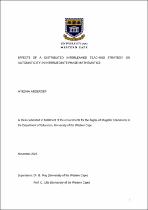| dc.contributor.advisor | May, Bruce | |
| dc.contributor.author | Abderoef, Ayesha | |
| dc.date.accessioned | 2023-05-10T09:10:01Z | |
| dc.date.available | 2023-05-10T09:10:01Z | |
| dc.date.issued | 2023 | |
| dc.identifier.uri | http://hdl.handle.net/11394/9894 | |
| dc.description | Magister Educationis - MEd | en_US |
| dc.description.abstract | The Trends in International Mathematics and Science Study (TIMSS) in 2015 indicate that South African learners fare poorly against their international counterparts. Results of these tests show that South African learners are not at the desired level of development in terms of mathematics learning. There is thus a need to find suitable teaching and learning strategies that can improve the status quo.
Mathematics learning is particularly sequential in nature and builds and progresses on the foundation of sound prior knowledge. It stands to reason, that the implications for teaching and learning would be to introduce better techniques and skills that improve retention of mathematics procedures and concepts. | en_US |
| dc.language.iso | en | en_US |
| dc.publisher | University of the Western Cape | en_US |
| dc.subject | Learning skills | en_US |
| dc.subject | Teaching and Learning | en_US |
| dc.subject | Mathematics learning | en_US |
| dc.subject | Intermediate phase | en_US |
| dc.subject | South Africa | en_US |
| dc.title | Effects of a distributed interleaved teaching strategy on automaticity in intermediate phase Mathematics | en_US |
| dc.rights.holder | University of the Western Cape | en_US |

